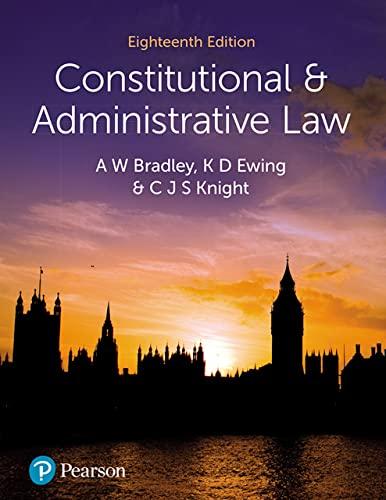Question
Arvin, a car mechanic (and owner of Fixacar Co. Ltd), is 50-years old and suffers from mild dementia. Arvin's business has not been going well
Arvin, a car mechanic (and owner of Fixacar Co. Ltd), is 50-years old and suffers from mild dementia. Arvin's business has not been going well recently because of his illness. He and his wife, Angela, work casually (Arvin as a mechanic and Angela as an artist), and jointly own two mortgaged properties (one in which they live) in the inner city. One day, Arvin receives a call from Tony, a close family friend. Tony works as a property and finance consultant, and Arvin has relied on Tony's advice ever since he was diagnosed with dementia. Tony tells Arvin that now is a good time to invest in rural property, and that it would help Arvin pay off the mortgage of his two houses quicker. Arvin has been quite anxious about his loan repayments, so he asks Tony how to go about acquiring a rural property. Tony explains to Arvin that he can secure a loan at a very good interest rate if Arvin is willing to put up his two properties to secure the loan, and to guarantee the loan. Tony advised Arvin, that Arvin could use his mechanic business to secure the loan. The loan documentation included a certificate of independent legal advice to be signed by a lawyer and a certificate of independent financial advice to be signed by an accountant. It was through Tony's associated business connections that these certificates were obtained and signed. Arvin signs the loan agreement with JohnnyBank Ltd. (through Tony). After six months, Arvin is unable to pay the repayments for the loan. JohnnyBank wish now to secure their rights over the mortgaged properties. Arvin comes to you for advice. You recall reading a High Court case in the recent past (last few years) that sounds similar to Arvin's situation.
Apply IRAC in your answer:
Issues: Identify the issues (main issues and sub issues) arising from the facts. To highlight that you are aware of the key issues in a question, you should raise these at the beginning of the answer. Stating the relevant issues clearly and simply at the outset will indicate to the examiner that you have a good understanding of the issues to be discussed.
Rule: Once the essential issues have been identified, it is then necessary to identify the relevant law (legislation and cases) to solve the problem.
Application: Your primary task in answering a law exam question is to apply the law you have studied to a particular set of facts. In answering questions, you should avoid re-stating the facts. Marks are not awarded for repeating the facts. They are awarded for answering the question. As a general rule, you should only refer to facts when discussing them in the context of the relevant law.
Always support your arguments with references to the relevant law. You should state the legislative sections and names of the case law that are applicable.
It is not enough to simply state the principles of law that are relevant to an exam question. It is necessary to apply these principles of law to the facts of the problem. State how the law may/may not apply to the facts and identify any similarities to previous cases or points of difference.
Present a balanced and objective argument- you should explain alternative sides to an argument in your answer.
Conclusion- Be sure to provide a balanced view and a reasoned conclusion which is consistent with the views put forward in your arguments relating to the application of the law. The conclusion should be brief and to the point and should directly answer the question posed
Step by Step Solution
There are 3 Steps involved in it
Step: 1

Get Instant Access to Expert-Tailored Solutions
See step-by-step solutions with expert insights and AI powered tools for academic success
Step: 2

Step: 3

Ace Your Homework with AI
Get the answers you need in no time with our AI-driven, step-by-step assistance
Get Started


